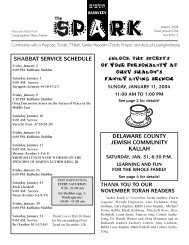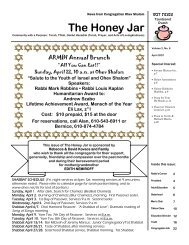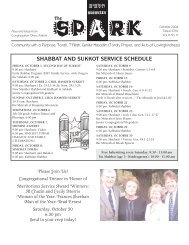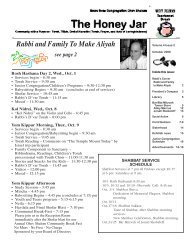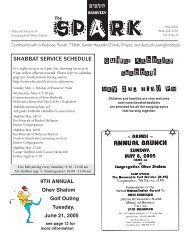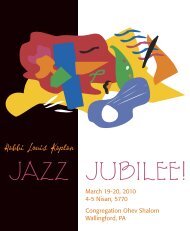Honeyjar 0508 - Congregation Ohev Shalom
Honeyjar 0508 - Congregation Ohev Shalom
Honeyjar 0508 - Congregation Ohev Shalom
Create successful ePaper yourself
Turn your PDF publications into a flip-book with our unique Google optimized e-Paper software.
Volume 3, No. 9<br />
Page 11<br />
Cantor Acker’s Notes on Performance<br />
From program for his recital at Gratz College, February 2, 2007<br />
The nexus of performance and<br />
worship has long fascinated<br />
me. How distinct are the two<br />
from one another Isn’t it true<br />
that the best worship<br />
experiences are those that are<br />
most well prepared—rehearsed<br />
if you will And when<br />
something is well rehearsed,<br />
isn’t it not only well practiced,<br />
but also supported by the<br />
knowledge and intention<br />
(kavanah) commonly<br />
associated with worship<br />
When expertise, artistry,<br />
knowledge and intention<br />
combine authenticity results.<br />
And isn’t it really authenticity<br />
that we all—performers,<br />
audiences, worshippers and<br />
cantors—really seek<br />
What difference there is<br />
between performance and<br />
worship lays mainly in how<br />
great the distance between the<br />
singer/cantor and the persona<br />
he or she plays. We commonly<br />
think, for instance, that while<br />
the personality of the singer<br />
playing Don Giovanni is far<br />
removed from that of the<br />
rogue (of course there may<br />
also be surprisingly numerous<br />
points of commonality), the<br />
cantor is playing himself. But<br />
this is not really so. When a<br />
poet reads her own work she<br />
dons a persona—albeit one<br />
much closer to her own—and<br />
this doesn’t diminish her<br />
authenticity. So, too, does the<br />
cantor assume a persona when<br />
she ascends the bimah. She<br />
transmits, in a highly inflected<br />
musical form, texts that are<br />
many generations old, laden<br />
with metaphor and ambiguity.<br />
No cantor can effectively<br />
convey such a stylized message<br />
by just being her ordinary self,<br />
no matter how “natural” she<br />
may come to feel in her role.<br />
In other words, she performs<br />
the text. Authenticity, then, is<br />
not a function of place or the<br />
degree of artifice that conveys<br />
any particular performance or<br />
worship service. Rather, it is a<br />
function of the singer’s ability<br />
to commit to and fully embody,<br />
seemingly spontaneously, the<br />
message of the text, secular or<br />
sacred.<br />
My point may be best<br />
illustrated by what I have<br />
experienced in preparing<br />
children to lead prayers in<br />
worship services. The values I<br />
stress, whether with my<br />
children’s choir or individual<br />
b’nai mitzvah, are: study,<br />
proficiency, understanding,<br />
intention (or kavanah),<br />
discipline, singularity of<br />
purpose, respect (for place and<br />
others) and the ability to allow<br />
all these above to dissolve<br />
spontaneously through the joy<br />
of making music. Parents<br />
invariably remark that they<br />
have never seen their children<br />
so sincerely involved in prayer.<br />
While I believe this is true, I also<br />
know that my preparation of<br />
the children for a theatrical<br />
production differs in material<br />
only; the values taught are<br />
exactly the same. So aren’t the<br />
children on the bimah really<br />
performing every bit as much<br />
as those on the stage<br />
I believe so. And what this<br />
observation testifies to is the<br />
profound desire we all have—<br />
whether performers, cantors,<br />
audience, or worshippers—to<br />
find and create experiences<br />
that afford opportunity to<br />
achieve an altered state of<br />
mind. What we call this altered<br />
state—no matter how fleeting it<br />
may be—depends on the<br />
context. In synagogue we call<br />
it “prayer;” in the theater and<br />
concert hall we call it<br />
“performance.” In either case,<br />
at its best, we experience<br />
something otherworldly,<br />
something quite mystical—even<br />
Divine. And it is this that keeps<br />
us coming back for more<br />
wherever we find it.<br />
Cantor David Acker





